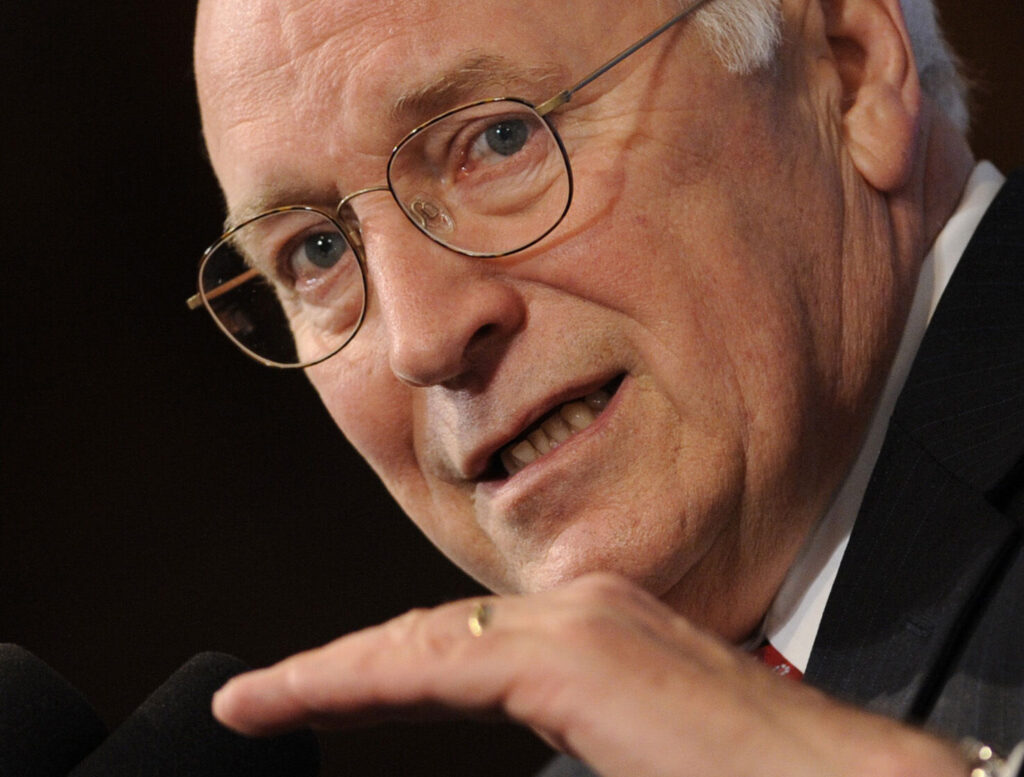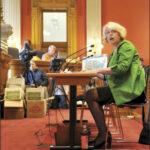Three state Republican chair candidates pitch platforms to Highlands Ranch GOP
It was all elbows and Spartacus at a spirited forum featuring the candidates for state GOP chairman last Friday at a meeting of the Highlands Ranch Republicans.
Former congressional candidate George Athanasopoulos, former El Paso County Republican Party Chairman Jeff Hays and Grand Junction activist Kevin McCarney, who chaired Donald Trump’s presidential campaign in Mesa County, introduced themselves and then took questions for nearly an hour at the GOP group’s monthly breakfast at Salsa Brava restaurant in Highlands Ranch.
It was the first time all three state chair candidates had appeared at the same event, and they wasted little time staking out distinct positions, describing different visions of the Republican Party and how it should approach next year’s election.
Along the way, Hays called Athanasopoulos “disingenuous” and said his plans would lead to the destruction of the Republican Party in Colorado, while Athanasopoulos said that if the party follows Hays it will wither and die, going the way of the GOP back east.
McCarney warned that if Republicans lose next year’s gubernatorial election, counties on the Western Slope will secede from Colorado, and Sherrie Gibson, the lone candidate for state GOP vice chair, made an off-the-cuff remark about Democrats that had her campaign manager scrambling to make sure it was clear what she’d meant to say.
And at the end, before the state chair candidates shook hands and shouldered out into the unexpectedly fierce blizzard that had descended on the suburb during the meeting, Athanasopoulos summed up the forum: “It’s been feisty,” he said. “We air our grievances here, we paint sharp contrasts, we paint in bold colors, and then we unite.”
There’s no doubt the colors were bold and the contrasts were sharp.
All three candidates agreed on a couple things: they all intend to take a salary as state chairman, and they all believe next year’s gubernatorial and legislative elections will determine the party’s fate in Colorado for years to come.
McCarney laid out the stakes clearly: “For the Republican Party in Colorado, if we don’t win in 2018, we are done,” he said. McCarney argued that if Democrats win the governor’s race and maintain – or expand – their numbers in the General Assembly, the opposition will be in charge of reapportionment after the 2020 Census and then end up with “complete control” of state government, leading to the end of the Taxpayer Bill of Rights and other checks on their power.
“But this election in 2016 gave us an opening,” he said, contending that the GOP needs to reach out to the blue collar workers who supported Trump. “We need to unify,” he added. “If we have a clown car election like we had for Senate this time, we are going to be down the tubes for governor.”
Hays argued that the GOP needs to start knocking on doors and organizing statewide immediately, adding that the most important thing to do was to begin raising the vast sums Republicans will need for the 2018 election. That includes fully funding the Colorado Republican Party’s independent expenditure committee, an entity that has been mired in lawsuits until recently but should be ready to start helping elect Republicans for the next cycle.
“George has advocated blowing up the IEC,” Hays said. “That’s extremely dangerous and naïve.” He said the plans laid out by Athanasopoulos – to reorganize the IEC with different guardrails and a new governing board – will only force the entity back into more litigation. “It’s not an ideological entity, it’s a fundraising entity, and we need that to raise $10 million,” Hays said.
As for party fundraising, Hays said donors would find him trustworthy because of his track record over the last four years raising money and increasing the number of donors in El Paso County. “That’s when people give you money.”
Athanasopoulos pitched his plan – based in part on his experience in the Army running counter-insurgency campaigns in Iraq – to organize offices across the state and take the ground game to the Democrats. Contrasting Colorado’s election results with the vote last fall when Michigan, Wisconsin and Pennsylvania – three traditionally blue states – went red in the presidential election, he added, “Things are not good here in the Centennial State. We need to work; we do have a plan.”
As far as his fundraising prowess, Athanasopoulos acknowledged that he didn’t raise a lot of money in his run against U.S. Rep. Ed Perlmutter last year but pointed out he surpassed the number of votes won by the vastly better-funded 2012 nominee, the late Joe Coors.
“It was a losing effort, but I fought, and we will continue to fight,” he said.
A Republican in the audience said the party could learn a lot from former U.S. Rep. Bob Beauprez’s 2014 gubernatorial loss. “Hired guns lose. The left has passion,” he said, asking how the chair candidates intended to keep the fire alive among Colorado Republicans.
“Word,” Athanasopoulos said. “Let’s be honest. Money doesn’t win elections. It is a task – you have to have money – fundraising is a task, but you have to have a plan, you have to have a purpose.”
Then he launched into his most prominent ongoing criticism of Hays, defending the precinct caucus system against his opponent’s predilection to scrap caucuses and instead only use petitions to qualify candidates for the primary ballot.
“The caucus system,” Athanasopoulos said, “gives ordinary citizens access to the ballot, and it is a fantastic party-building mechanism. If we adopt Jeff’s plan, that’s gone – that’s gone, and money rules, we become New Jersey. … If it’s just money and signatures, only rich people will be able to compete.”
Athanasopoulos reminded the Republicans about a key plank in his platform, his intention to challenge Proposition 108, a statewide ballot measure adopted last fall to open primaries to unaffiliated voters.
Calling the move “one step toward destroying our party,” Athanasopoulos said he plans to challenge the statute in court, at least in hopes of delaying its implementation until the General Assembly has time to fix it. He added later that he plans to approach legislators to sponsor a late bill to address concerns with the measure.
“It takes offense, defense, a kicking game; it takes equipment managers,” responded Hays, a former Air Force Academy and Denver Broncos football coach, pulling out a metaphor familiar to anyone who’s heard him speak for very long.
A bit later, he swung back at Athanasopoulos.
“I spoke out against 107 and 108, but we got it,” Hays said, also referring to another successful ballot measure that establishes presidential primaries in the state. “Voters jammed it down our throats. We got it.”
Noting that the Legislature has to “fix 107 and 108 to make it palpable,” Hays argued that Athanasopoulos’s approach would be disastrous for Republicans.
Doing what his opponent suggests – challenging open primaries in court, potentially branding the GOP as the only party that doesn’t want to compete for unaffiliated voters in its primaries – would “ensure (Republicans) going down in flames.”
“I’m willing to take this sandwich I didn’t want to eat, and I’m willing to build that infrastructure and reach out to those unaffiliated voters … and give them a product they can believe in,” Hays said. “It’s an opportunity, not a crisis.”
Later, Hays put it more bluntly: “George has been disingenuous, and he will destroy this party, if we do what he wants to do,” he said. The caucus system was established by the Legislature a century ago, he noted.
If Republicans decide to opt out of open primaries next year – a possibility the law allows and that some Republicans have been discussing – “it would be a win-win for the Democrats,” Hays said. “They would be able to jab us in the eye and say, ‘They are the party that hates you, that doesn’t want you.'”
Instead, Hays added, he intended to “go with the law, abide by the law and dutifully execute the law.”
In his closing remarks, Athanasopoulos returned to the topic of caucuses and open primaries. Saying he supports the current “hybrid” nominating process – candidates can access the primary ballot either by the caucus and assembly system or via petitions – he reiterated his plans to ask state lawmakers to delay Proposition 108 and suggested Democrats would get on board “because they don’t like it either.”
“I feel our passion, because that’s how I got involved,” McCarney said. “I’m the only guy here whose tea party group was chased by the IRS.” Speaking to the Republican who’d expressed concern about the party’s ability to excite Republicans, he added, “We have people like you in Mesa County that want to step up but get turned away.”
As far as embracing open primaries, McCarney said he understood why voters approved Proposition 108 – his wife, after all, is unaffiliated, he mentioned more than once. “They say, ‘Why do I have to pay for a primary I can’t participate in?’ That’s taxation without representation,” he said. His wife, McCarney added, is passionate and “yells at the TV more than I do” but won’t affiliate with the GOP because she isn’t happy with the candidates Republicans are coming up with.
Proposition 108, he concluded, is the law “and we need to deal with it.” Instead of arguing about who should be suing over it, McCarney said, “We need to reach out and get that unity message, that everyone’s welcome in this party.”
A bit later, McCarney referenced some lines from the Kirk Douglas movie “Spartacus,” one of several times he invoked the famous scene.
“What we can’t get into this election cycle is the old ‘Spartacus’ routine,” he said. “‘I’m more conservative,’ ‘No, I’m more conservative!’ We have to have candidates who reach into the Donald Trump coalition – that’s the key to turning the state red.” He added that the flood of Democrats who showed up in the Mesa County Trump office was stunning. “And we’re not reaching out to them.”
As the forum neared its end, McCarney summed up his case: “I’m one of you. I’m the guy out there working, I’ve never been paid for a political position in my life, but I see the need in this party, and that’s why I’m in the race.”
Then he added some points that occasioned more than a few double takes from the Republicans at the restaurant.
“If we lose the governor’s race, you’re going to see me and other western counties in Colorado leave Colorado – we will secede,” McCarney said, adding, “We feel like the left-out children.”
Gibson’s brief remarks to Republicans after the forum had concluded also occasioned a few double takes.
After complimenting the state chair candidates – “all three of them are smart, passionate and want to win” – she talked about her background building the volunteer corps that pulled El Paso County Commissioner Darryl Glenn to victory in last year’s crowded U.S. Senate primary. Then she mused about how Republicans can present core issues from a fresh perspective for voters who don’t necessarily identify with the GOP.
Everyone wants safe schools, she said, but Republicans can alienate voters “by pounding the door saying, ‘Second Amendment, Second Amendment!'” Instead, she suggested, how about approaching it another way, saying, “What if you were able to have a gun, saying you were able to protect your child – it’s a different message.”
Summing up, Gibson said, “Everyone says, ‘She’s so nice,’ but guess what – I’m the person who wants to shoot the hostages, and the hostages are the Democrats.” Some members of the crowd audibly gasped and a few chuckled, shaking their heads.
Only seconds later, her campaign manager sent a frantic text message to The Colorado Statesman, asking the reporter to make sure “not each other” was at the end of Gibson’s quote. A moment later, another text message arrived: “not literally.” And shortly after that, Gibson meandered across the restaurant and whispered to the Statesman reporter, with a somewhat sheepish smile, “Alright, we’re not shooting hostages, OK?”
The Republican state central committee meets the morning of Saturday, April 1 at Englewood High School to elect officers for the next two years. In addition to the three state chair candidates vying for an open seat – incumbent chairman Steve House said in late January that he wouldn’t be running for a second term – and Gibson, the only announced candidate for vice chair, incumbent state GOP secretary Brandi Meek is seeking a second term without opposition. The state party’s annual Centennial Dinner, featuring keynote speaker Wyoming Sen. John Barrasso, is set for the night before in Greenwood Village.












